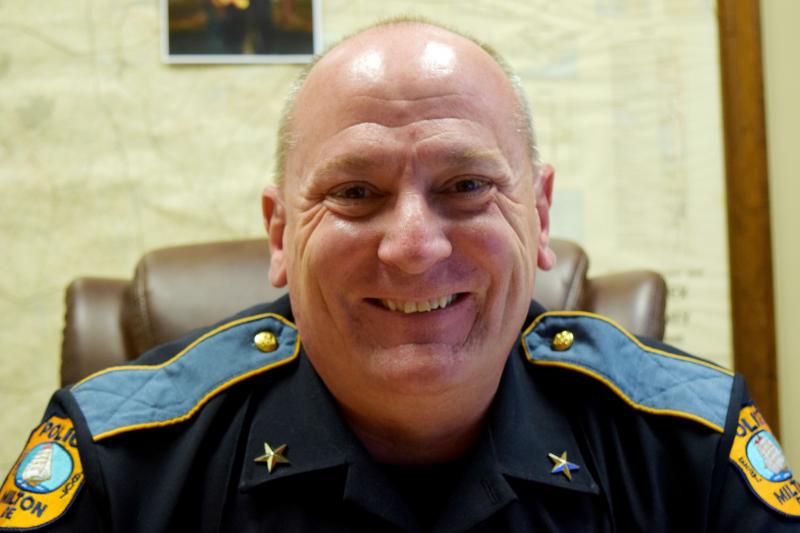New police chief settling in to Milton community
It has only been a few months since Chief Robert Longo placed a Milton badge on his new navy blue uniform, but the veteran law enforcement officer has high hopes for the town police force and developing relationships with local residents.
FUN FACTS ABOUT CHIEF LONGO
Favorite comfort food: Buffalo chicken wings
Favorite movie: In the Line of Fire
Favorite music: Everything from rock to hip hop – Brandy, Biggie Smalls, Rolling Stones, Rush
Favorite superhero: Captain America
Biggest fear: Rats and mice
Hobbies: Camping, fishing, running, biking, spending time with family
The Syracuse, N.Y., native began his criminal justice career as a police dispatcher in New Jersey, and worked his way through corrections, detention, environmental crimes, internal affairs and gang intelligence units in New Jersey and Maryland, as well as the U. S. Department of Defense before finding his calling in Bridgeville. For just over five years, Longo served as the department's chief, and plans to bring to Milton some of the grant funding, policing techniques and community-based approaches that helped Bridgeville's officers build bridges with residents.
Longo also serves as a member of the Delaware Police Chief's Council and as a training sergeant with the Delaware Army National Guard. He lives on Delmarva with his wife of 20 years, Christine, and their pets, and loves spending time with his three children and two grandchildren.
Q: What does community policing mean and how do you plan to bring that approach to Milton?
A: Community policing, in the short term, is a partnership between law enforcement and the entire community. Business owners, whether they live here or not, our schools, educators, our churches, our youth – it's everybody working together. And when you have that, it makes for a safer community, and it builds trust. That's what we did in Bridgeville, and that's what we're going to do here. We're going to speak with local groups and reinstitute the Coffee with a Cop program. We're going to go out and speak with our local churches, the Boy Scouts and the Girl Scouts, our senior citizens. These are my hopes.
Q: What are the biggest public safety concerns in Milton?
A: I'm still getting a grasp on things, but I definitely think our biggest crime and safety concerns are drugs in the community. That can lead to a variety of things: death from an overdose, suicide, homicide, assaults, thefts, domestic violence. That is my biggest threat right now. Heroin and drugs are in every community in America, from the poorest town to the richest town. There's drugs everywhere. You can see we just lost another celebrity to drug overdose. It doesn't discriminate.
Q: Are you considering any type of policy or program that focuses on addicts receiving treatment rather than jail time?
A: If you want to help yourself, I will try to help any way I can. I understand addiction is a problem, whatever the addiction is. When you're coming to me and asking me for help, I'm obviously your last resort. So if I – the Milton Police Department – help you out, don't come back and slap us in the face. If there's violence involved, our hands are kind of tied on that – you're going to get criminally charged and you're going to go to detox through jail. It would depend on what they've done. You can't use drugs as an excuse to rape, murder or assault somebody intentionally. But if a person needs help, while they're in jail, they have that opportunity to get help. It's not up to me. We have a job to do, and that's to enforce the law, but the judge will make a recommendation that might include treatment if jail time is not involved. But if John Q walked in off the street and asked for help, we're going to help him. You show an interest, and you never know how it's going to change a life.
Q: In light of national events involving police brutality, what additional training or knowledge do you think the Milton Police Department needs?
A: You need to have an open dialogue with the community – the entire community. And I will not tolerate anybody being discriminated against for any reason. Sex, race, sexual preference, religion, it does not matter to me. My job is to ensure the people in this town trust their police department. We do have in law enforcement, unfortunately, people who have tarnished our profession. Being a police chief and admitting that, people might look at you like you have three heads, but I'm being honest.
Camping, fishing, running, biking, spending time with family
Our officers go through training at least two or three times a year to understand the appropriate use of force. I tell them to ask questions of the captain, the lieutenant or myself. It's a learning process, but when you stop learning, you become a threat. Even as the chief. I'm fortunate because our force is relatively young in experience, so they're aware of what is appropriate and what is not. And within six months, I'll start looking at our arrests and our tickets to make sure that it is in line with what our population is. I believe in being proactive.
Q: Turnover at the Milton Police Department has been a concern for residents and town officials. Now that officers have received pay increases, what are some other ways you plan to keep officers in Milton?
A: One of the things that I believe in is including the officers in the decision-making process that affects them. It's called empowering your staff. With many decisions, I will ask for their input on certain things and what they think because they're the ones that are doing it. But you really have to empower your staff and prepare them for the next level. You recognize your officers for a job well done. When people are recognized for a job well done, they appreciate it. If you look at the list of why people stay or go to jobs, obviously pay and benefits are at the top, but also recognition. You can't put a price tag on going up to somebody and saying, "fantastic work," especially to young officers. You encourage them by doing that.
Q: What advice do you have for Milton residents to keep their community safe?
A: If you see something, say something. If they see a crime, maybe someone breaking into a house or a suspicious vehicle, they need to call dispatch at 302-855-2980, which is the state police communication, which will immediately dispatch us, but also send other units for support. If they see a crime, and it's an emergency, they need to dial 911.
We, the police department and the community, need to partner. It goes back to the very first question. That's something that's going to make the whole community safe. When people take pride in their town, when they take pride in their community, when they take ownership in their community, whether it be a new development, the old section of town or apartments, that makes it safer because when criminals know they're being watched, they don't like it. We also have to remember police work takes time. This is not NCIS – we can't solve crimes in 45 minutes, minus 15 minutes for commercials. We need to partner together, and residents need to report the crime.






















































